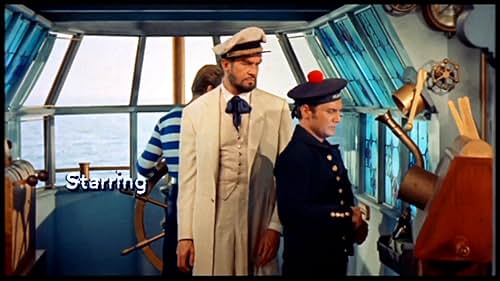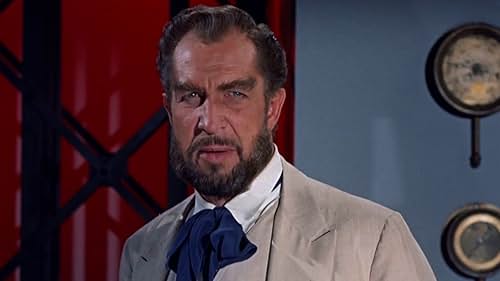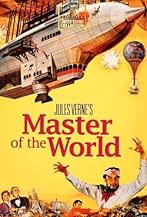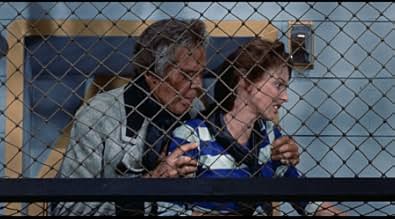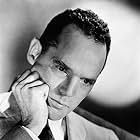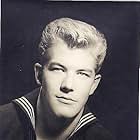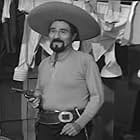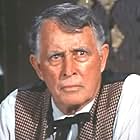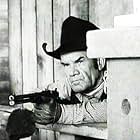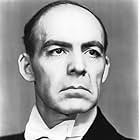In 1868, an American scientist and his team become hostages of fanatical pacifist Robur who uses his airship Albatross to destroy military targets on Earth.In 1868, an American scientist and his team become hostages of fanatical pacifist Robur who uses his airship Albatross to destroy military targets on Earth.In 1868, an American scientist and his team become hostages of fanatical pacifist Robur who uses his airship Albatross to destroy military targets on Earth.
- Awards
- 1 nomination
- Topage
- (as Vitto Scotti)
- Man at Balloon Society Meeting
- (uncredited)
- Wilson
- (uncredited)
- Man at Balloon Society Meeting
- (uncredited)
- Man at Balloon Society Meeting
- (uncredited)
- Man at Balloon Society Meeting
- (uncredited)
- Talkative Morgantown Townsman
- (uncredited)
- Man at Balloon Society Meeting
- (uncredited)
- Weaver
- (uncredited)
- Morgantown Townswoman
- (uncredited)
- Prudent's Butler
- (uncredited)
- Director
- Writers
- All cast & crew
- Production, box office & more at IMDbPro
Storyline
Did you know
- TriviaAmerican-International Pictures had planned on doing a sequel to this film. Concept drawings and even concept models were reportedly made. The sequel was not produced.
- GoofsThe film is set in the 1800s, though as the Albatross flies over London, Robur looks through the scope and sees Elizabethan London, including Shakespeare's Globe Theatre. The shot is stock footage from Henry V (1944). Soon after, more recent London footage appears, including the 19th century Tower Bridge. The aerial view of Paris is definitely 20th century.
- Quotes
Prudent: You, sir, are mad! Quite, quite mad!
Robur: How like the reasoning of your kind, Mr. Prudent. All well and sane to be the owner of factories, that products of which cause the violent deaths of millions in wartime and in peace. But to kill hundreds or even thousands with the aim of ending such deaths for all time? This is "madness."
Prudent: And do you, sir, consider the man who makes a weapon responsible for the action of the man who buys it?
Robur: Yes, I do, sir! All men are responsible to all other men.
- Crazy creditsClosing credits: "I take my dream with me. But it will not be lost to humanity. It will belong to you the day the world is educated enough to profit by it and wise enough not to abuse it" From Jules Verne's MASTER OF THE WORLD
- Alternate versionsThe U.S. 16mm television syndication prints remove the prologue (showing man's early attempt at flight) and the exit music. This brought the running time down to what could be shown in a typical two-hour time frame with little or no editing to the main body of the film.
- ConnectionsEdited from The Four Feathers (1939)
- SoundtracksMaster of the World
Music by Les Baxter
Lyrics by Lenny Adelson (as Lenny Addelson)
Sung by Darryl Stevens
Although there are some problems with this film primarily due to its budget, and some viewers might be put off by the obvious similarities to Disney's version of 20,000 Leagues Under The Sea (1954), I enjoyed this somewhat wacky sci-fi/fantasy/adventure film quite a bit, and gave it a 9 out of 10.
The film actually opens with a brief but clever, tongue-in-cheek black & white documentary about the history of flying machines. Abruptly, at the narrative line "Master of the World", the documentary ends. Then we change to color as we're taken to a sumptuously fantastic Pennsylvania town, complete with towering mountains and a seeming volcano.
I have to admit that director William Whitney already had me in the palm of his hand at that moment. I'm all for weird transitions, surrealism and beautifully saturated color cinematography. To make things even better, just as a character tells us how boring the town is, a booming voice (obviously Price's), quoting a doom-laden passage from scripture, emanates from the vicinity of the mountain.
I was also easily sold on the film because I'm a big Vincent Price fan. Price is great, even though the context of the role is a bit unusual for him. There is a lot of comic relief throughout most of the film, and the genre wasn't his norm. However, he comes across as menacingly demented yet suave as always. The rest of the principle cast was marvelous, too, with Charles Bronson playing an early version of Harrison Ford (maybe he always did that), Mary Webster as an appealing love triangle target, and some very fun and appropriate overacting from Henry Hull doing an early obnoxious "I'm an American" shtick and David Frankham as the perpetually irascible Victorian sap.
It's a blast noting all of the future tech elements from past eras' perspectives, and the set design and special effects are actually admirable given that this was a low-budget film for its ambitions. Even the stock footage and footage from the 1944 Henry V (the shots of London that look like a medieval town), although at times obvious, are incorporated well. On the other hand, there is some similarity between the set design and that of a particular era and class of television show--say the Adam West Batman, the original Star Trek, or even the Tom Baker Doctor Who--which all have a fairly low-budget look, but I have to admit that I love those shows, too.
There isn't much of an easily discernible subtext in the film, but of course that's because Master of the World wears its messages proudly on its sleeve. I won't state them explicitly here, as in my view that would be a spoiler, but it's notable, like many other aspects of the film, for its similarity to 20,000 Leagues, including its moral ambiguity. This would actually be a good film, as would 20,000 Leagues, to show a freshman-level ethics class as an exemplification of and discussion launching pad for both utilitarianism and deontology.
Although it's not exactly the most original film to come down the pike (but primarily just because of 20,000 Leagues), and it's not a faithful adaptation of author Jules Verne's work, I don't subtract points for either of those characteristics. Master Of The World has an engaging, solid story that is both thought provoking and a lot of fun.
- BrandtSponseller
- Jan 29, 2005
- Permalink
- How long is Master of the World?Powered by Alexa
Details
- Release date
- Country of origin
- Language
- Also known as
- Jules Verne's Master of the World
- Filming locations
- Production company
- See more company credits at IMDbPro
Box office
- Budget
- $1,000,000 (estimated)
- Runtime1 hour 42 minutes
- Aspect ratio
- 1.85 : 1
Contribute to this page


